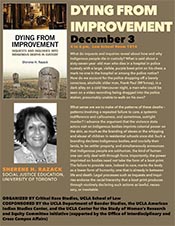
Dying from Improvement
Event Information
 Presented by Sherene H. Razack, Social Justice Education, University of Toronto
Presented by Sherene H. Razack, Social Justice Education, University of Toronto
Thursday, December 3. 2015
4-6 PM, Law School Room 1314
What do inquests and inquiries reveal about how and why Indigenous people die in custody? What is said about a sixty-seven-year-old man who dies in a hospital in police custody with a large, visible, purple boot print on his chest, a mark no one in the hospital or among the police notice? How do we account for the police dropping off a barely conscious, alcoholic older man, Frank Paul (Mi'kmaq), in a dark alley on a cold Vancouver night, a man who could be seen on a video recording being dragged into the police station, presumably unable to walk on his own?
What sense are we to make of the patterns of these deaths - patterns involving a repeated failure to care, a systemic indifference and callousness, and sometimes, outright murder? I advance the argument that the violence state actors visit on Indigenous bodies imprints colonial power on the skin, as much as the branding of slaves or the whipping and abuse of children in residential schools once did. Such a branding declares Indigenous bodies, and crucially their lands, to be settler property, and simultaneously announces that Indigenous people are subhuman, the kind of human one can only deal with through force. Importantly, the power imprinted on bodies need not take the form of a boot print. The failure to provide care, indeed to care, marks the body as a lower form of humanity, one that is already in between life and death. Legal processes such as inquests and inquiries endorse the racial hierachy that a boot print produces through routinely declaring such actions as lawful, necessary, or inevitable.
Organized by Critical Race Studies, UCLA School of Law
Co-sponsored by the UCLA Department of Gender Studies, the UCLA American Indian Studies Center, and the UCLA Center for the Study of Women's Research and Equity Committee initiative (supported by the Office of Interdiscplinary and Cross Campus Affairs)
UCLA is a tobacco-free campus. All-day parking ($12) and short-term parking (payable at pay stations) are available in Lots 2, 3 and 4 (enter the campus at Hilgard and Westholme avenues).





